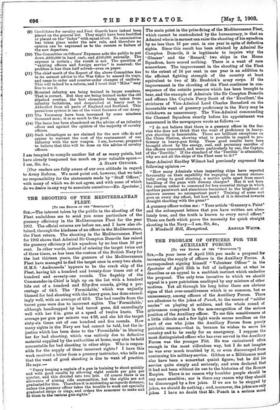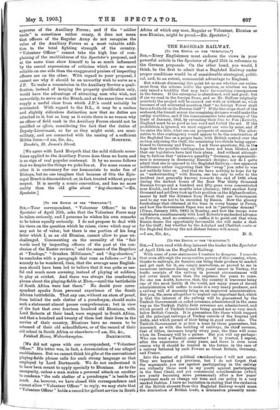THE PROBLEM OF OFFICERS FOR THE AUXILIARY FORCES.
[TO THE EDITOR 07 THE " SPECTATOR.1
SIR,—In your issue of April 18th you made a proposal for increasing the supply of officers in the Auxiliary Forces. A correspondent signing himself "Volunteer Officer" in the Spectator of April 25th is full of indignation at what he describes as an appeal to a snobbish instinct which underlies the proposal. The only true incentive to which we should appeal is a pure patriotism unalloyed by any mixture of other motives. Yet all through his long letter there are obvious signs of that over-sensitiveness which is so common, but so unnecessary, among officers of the Auxiliary Forces. There are allusions to the jokes of Punch, to the sneers of "soldier uncles" on playing at soldiers, and the whole round of grievances comprised in the non-recognition of the serious position of the Auxiliary officer. To me this sensitiveness at a little ridicule and a few light words seems needless on the part of one who joins the Auxiliary Forces from purely patriotic reasons,—that is, because he wishes to serve his country and to be ready for an emergency. I suppose the most distinguished officer who has ever served in the Auxiliary Forces was the younger Pitt. He was caricatured often enough in the moat ridiculous way, but I do not imagine he was ever much troubled by it, or even discouraged from continuing his military service. Gibbon as a Militiaman must also have been a somewhat quaint figure; but he did his service quite simply and seriously, and even declared that it had not been without its use to the historian of the Roman Empire. There is no reason why humbler people should be any more sensitive; nor is there any reason why they should be discouraged by a few jokes. If we are to be stopped by jokes, we should do nothing ; and, moreover, the jokes are only jokes. I have no doubt that Mr. Punch in a serious mood approves of the Auxiliary Forces ; and if the " soldier uncle" is sometimes rather crusty, it does not mean that officers of the Regular Army do not recognise the value of the Auxiliary Forces as a most valuable addi- tion to the total fighting strength of the country. " Volunteer Officer cannot take the high line of com- plaining of the snobbishness of the Spectator's proposal, and at the same time show himself to be so much influenced by the casual expressions of criticism which are no more reliable on one side than the exaggerated praises of inspecting officers are on the other. With regard to your proposal, I cannot see why it should be an unworthy wish to serve as a J.P. To make a commission in the Auxiliary Service a quali- fication, instead of keeping the property qualification only, would have the advantage of attracting men who wish, not unworthily, to serve on the Bench, and at the same time would supply a useful class from which J.P.'s could suitably be nominated. With regard to the D.L., it may be a useless and slightly ridiculous distinction now that no duties are attached to it, but as long as it exists there is no reason why an officer of field rank in the Auxiliary Forces should not be qualified as officio, considering the fact that the duties of Deputy-Lieutenant, so far as they might exist, are semi- military, and are connected with the raising of a sufficient
Militia force.—I am, Sir, &c., MORPETII. Brooks's, St. James's Street.
[We agree with Lord Morpeth that the mild ridicule some- times applied to the Auxiliary Forces does them no harm and is no sign of real popular contempt. It by no means follows that we despise the things we poke fun at. For some reason or other it is customary for our humourists to make fun of Bishops, but no one imagines that because of this the Epis- copal Bench is disconsidered, or, in fact, treated without proper respect. It is merely a comic convention, and has no more reality than the old gibe about "dog-shooters."—ED. Spectator.]











































 Previous page
Previous page